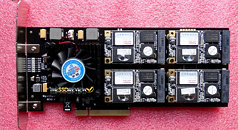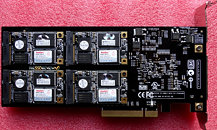- Joined
- Oct 9, 2007
- Messages
- 47,633 (7.44/day)
- Location
- Dublin, Ireland
| System Name | RBMK-1000 |
|---|---|
| Processor | AMD Ryzen 7 5700G |
| Motherboard | Gigabyte B550 AORUS Elite V2 |
| Cooling | DeepCool Gammax L240 V2 |
| Memory | 2x 16GB DDR4-3200 |
| Video Card(s) | Galax RTX 4070 Ti EX |
| Storage | Samsung 990 1TB |
| Display(s) | BenQ 1440p 60 Hz 27-inch |
| Case | Corsair Carbide 100R |
| Audio Device(s) | ASUS SupremeFX S1220A |
| Power Supply | Cooler Master MWE Gold 650W |
| Mouse | ASUS ROG Strix Impact |
| Keyboard | Gamdias Hermes E2 |
| Software | Windows 11 Pro |
In the swarming SSD market, what better way to blast your way from obscurity to worldwide attention, than launching a ludicrously fast SSD? KingSpec unveiled the MC2J677M1T, a PCI-Express SSD that's tested to be capable of sequential speeds as high as 2.5 GB/s (gigabytes per second). Pictured below, the drive is an almost full-height add-on card with PCI-Express 2.0 x8 bus interface. The card seats a high performance SATA 6 Gb/s RAID controller by LSI (under that fan-heatsink), which is wired to eight mSATA 6 Gb/s ports, holding the eight sub-units.
The eight mSATA SSD sub-units on the MC2J677M1T each hold 120 GB of data (totaling 960 GB). Each sub-unit runs a JMicron-made controller, Intel-made MLC NAND flash, and Nanya-made DRAM cache. The LSI RAID controller is designed to be plug-and-play, i.e., the drive is bootable, and you won't need an F6 driver during Windows installation to detect the drive. A quick ATTO benchmark run by TheSSDReview, which has one of these drives, yielded sequential read speeds well past 2,500 MB/s.



View at TechPowerUp Main Site
The eight mSATA SSD sub-units on the MC2J677M1T each hold 120 GB of data (totaling 960 GB). Each sub-unit runs a JMicron-made controller, Intel-made MLC NAND flash, and Nanya-made DRAM cache. The LSI RAID controller is designed to be plug-and-play, i.e., the drive is bootable, and you won't need an F6 driver during Windows installation to detect the drive. A quick ATTO benchmark run by TheSSDReview, which has one of these drives, yielded sequential read speeds well past 2,500 MB/s.



View at TechPowerUp Main Site







